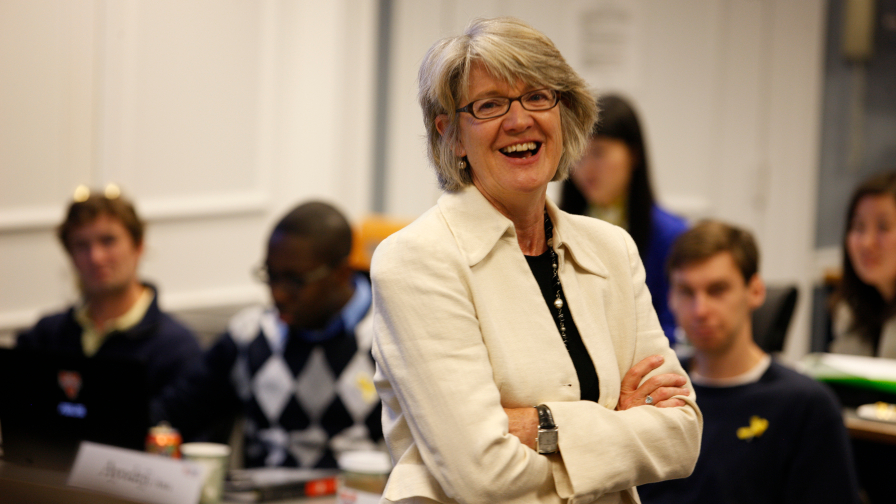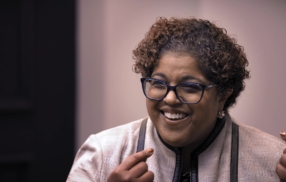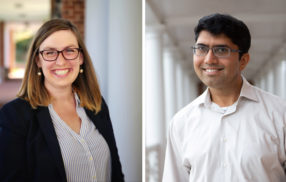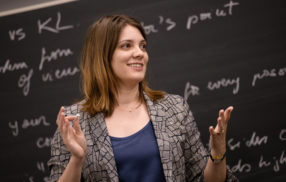
‘The Best MBA Faculty:’ Poets & Quants Breaks Down What Sets Darden Professors Apart
By Jay Hodgkins
The University of Virginia Darden School of Business faculty has been named the “Best MBA faculty” again, just weeks after a Bloomberg Businessweek survey revealed students rate Darden professors most inspiring and after The Princeton Review ranked Darden No. 1 for Best Professors for the second year in a row.
This time, it was Poets & Quants (P&Q) offering the accolade in a sprawling feature about the Darden and Yale faculties, which it named the best among MBA programs. The business education-focused publication broke down several factors that make the Darden faculty tops.
First, P&Q explored how teaching and research work in tandem at Darden:
Sankaran Venkataraman, the school’s senior associate dean for faculty and research and the MasterCard Professor of Business Administration. In his experience, faculty members can’t become a great teacher if they don’t care about ideas – or transmitting them to the best audiences.
“What Darden allows the scholar to be is a full and well-rounded scholar. Darden values ideas and the production of ideas. It values taking those ideas to young people who will be the future leaders of the world. It values taking those ideas and attempting to move the needle on practice. It provides a system and a support system that allows scholars to express themselves in a complete and energizing way.”
In some programs, Venkataraman has witnessed teaching and research at odds. Each vies for faculty time, with students footing the bill — but research leading to tenure. At Darden, he notes, each side informs the other, ultimately making faculty better at both.
“Research benefits from teaching and practice. You’re able to frame ideas and ask questions in your area of expertise that are more nuanced. The information is not just from your literature but the wider world. You inform practice with the benefit of your discipline and your field.”
The publication described Darden’s faculty as “high touch, high tone, high octane:”
The levels of preparation and conversation at Darden are higher than students have ever experienced — as are the expectations of faculty and peers.
“There is a sense of high touch in the classroom; they are all engaged in this together and they rely on each other to have a productive learning experience,” explains Venkataraman. “It is high octane: the energy levels are high. The stakes are high because class participation is a significant part of the grade — 30 percent to 45 percent. When a group of 65 high achievers gets involved in a topic of importance, the intensity level cranks up.”
These electrifying classes aren’t the only perk to Darden faculty. Being a professor also confers a high social status, Venkataraman observes. “You are respected by the staff, colleagues, and students. You can walk with your head held high. That’s not necessarily the case in other schools where I’ve had experience. Sometimes, when you’re an exceptional teacher, senior faculty will come up and say, ‘Perhaps you’re not allocating your time optimally and should spend more time on other areas like research.’ You don’t have that here.”
Better yet, Darden students often act as the faculty’s biggest cheerleaders, even stepping up sometimes to ease the load. “It is a small community,” Venkataraman adds. “You get positive strokes. There is a self-selected set of people, faculty, and students, who value teaching here. So there is an intrinsic motivation. Teaching well is rewarding; you see students grow and develop in front of you. The students help faculty members a lot too. They are so supremely well-prepared that they do 50–60 percent of the job for you. Even if you have a bad day in the classroom, they can carry the conversation forward.”
Lastly, the publication highlighted three star professors from the Darden faculty:
Among senior Darden faculty, Venkataraman admires Alec Horniman, a 52-year veteran of the program. His biggest talent? Separating teaching subject matter from helping a student learn it. “Those two are very different,” he indicates. “When you help a student learn your subject matter, you put yourself in their shoes. That’s very difficult for an expert to do. He is gifted in a way in that he will take any question and weave it into his larger class structure. He is able to elevate that question into a more general question. This forces students to think hard, reflect, and respond.”
Ed Freeman, a 32-year program veteran best known for his ethics courses, takes an approach that differs from his peers. He opens case discussions by asking students for their questions. This works, says Venkataraman, because Freeman — like Horniman — possesses an uncanny ability to be where the students are. “Ed has a supreme capability of connecting with every student in a way that the students feel he is speaking to him or her personally even though there are 65 students in the classroom.”
Professor Elena Loutskina
Among junior faculty, Venkataraman praises Elena Loutskina, a finance and investment professor who joined Darden in 2006. Watching her grow, Venkataraman is struck by how she brings Darden’s “High touch, high tone, high octane” spirit to life.
“She demands excellence from her students. She demands that they be prepared. She asks good and tough questions and she expects the students to be able to respond and holds them accountable. At the same time, she provides an incredibly supportive environment. The students feel that she is there to support them and help them to succeed. What happens is she sets a high bar, but she also shows them that if you do the work and come halfway, she will provide the safety net and together they will be able to accomplish great things.”
Read the full story from Poets & Quants.
The University of Virginia Darden School of Business prepares responsible global leaders through unparalleled transformational learning experiences. Darden’s graduate degree programs (MBA, MSBA and Ph.D.) and Executive Education & Lifelong Learning programs offered by the Darden School Foundation set the stage for a lifetime of career advancement and impact. Darden’s top-ranked faculty, renowned for teaching excellence, inspires and shapes modern business leadership worldwide through research, thought leadership and business publishing. Darden has Grounds in Charlottesville, Virginia, and the Washington, D.C., area and a global community that includes 18,000 alumni in 90 countries. Darden was established in 1955 at the University of Virginia, a top public university founded by Thomas Jefferson in 1819 in Charlottesville, Virginia.
Press Contact
Molly Mitchell
Senior Associate Director, Editorial and Media Relations
Darden School of Business
University of Virginia
MitchellM@darden.virginia.edu








